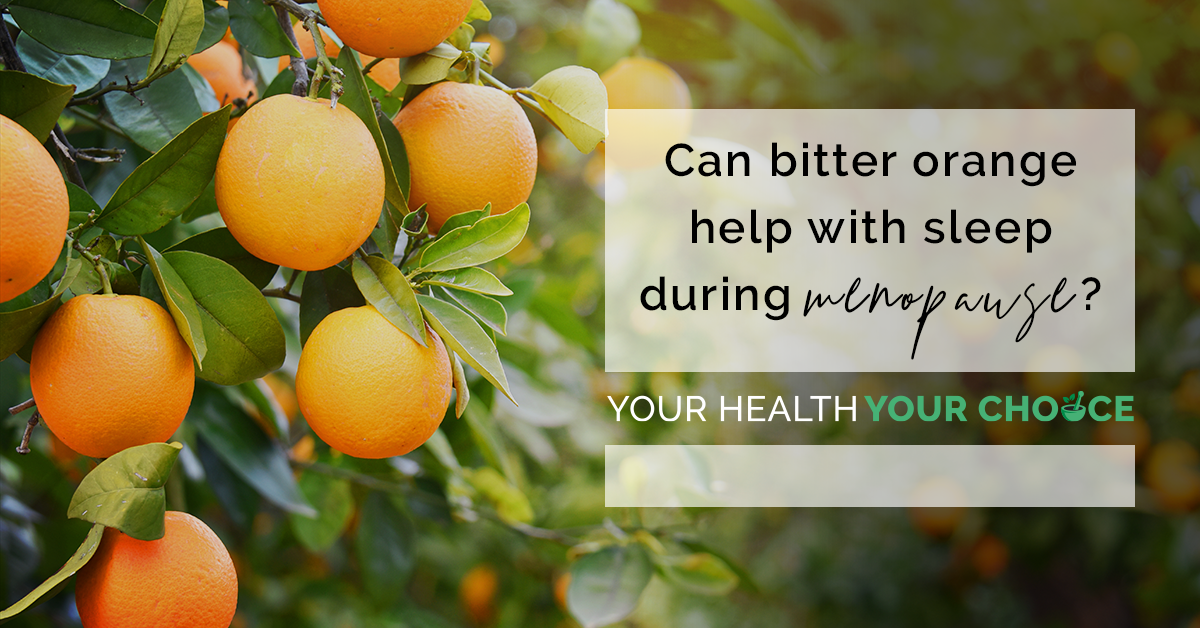Bitter orange for sleep problems during menopause

Menopause is a natural and important stage of a woman’s life that most commonly occurs between the ages of 45 and 55. A third (or more) of a woman’s life being after menopause. It is estimated that the population of menopausal women globally will reach 1.1 billion by the year 2025.
The drop in sex hormones that occurs at menopause can result in many women experiencing changes such as hot flushes, palpitations, depression, anxiety, sleep disorders, sexual problems, myalgia, and cardiovascular diseases. These can be ongoing and impact quality of life.
As a woman’s ovaries stop producing oestrogen during menopause, her adrenal glands must take over post-menopause production. If prior to menopause a woman has had years of being tired and stressed, and therefore already experiencing a degree of ‘adrenal fatigue’, this places further burden on the adrenals which can exacerbate menopausal symptoms.
There are a wide variety of natural therapies that have traditionally been used to assist women with menopausal symptoms, including naturopathy, herbal medicine, homeopathy, acupuncture and others.
This article focusses on recent research on the use of Bitter orange (Citrus aurantium) in menopausal women who experience sleep problems.
Bitter orange for sleep disorders in menopausal women:
Bitter orange (also known as Seville orange, sour orange, zhi shi) is native to eastern Africa, the Arabian Peninsula, Syria and Southeast Asia and is now also grown in many other parts of the world. Bitter orange essential oil is also known as neroli oil.
Bitter orange has been used in traditional Middle Eastern and Chinese medicine for indigestion, nausea, and constipation, in addition to uses in folk medicine to assist with everyday ailments – overlapping with its traditional culinary use.
The following clinical trials indicates that Bitter orange also has a role to play in assisting women experiencing sleep problems during menopause.
Azerbaijan trial:
A research group from Tabriz University in Azerbaijan compared the effect of both Bitter orange and Lavender (Lavandula spp.) on sleep quality in postmenopausal women. The trial was a triple-blind, randomised, controlled clinical trial conducted in 2015 and published in 2018.
Eligible postmenopausal women were allocated into one of two intervention groups or a control group (52 women per group), in a 1:1:1 ratio using a randomised block design. Each intervention group received 500 mg capsules containing either Bitter orange powder (group 1), Lavender flower powder (group 2) or starch (group 3, the control group).
The Pittsburgh Sleep Quality Index (PSQI) was used before and eight weeks after starting the intervention to assess changes in sleep quality. The PSQI is a self-report questionnaire that assesses sleep quality over a 1-month time interval – it consists of 19 individual items, creating 7 components that produce one global score, and takes 5–10 minutes to complete.
Analysis of the findings showed significant differences among the groups in the mean sleep score after eight weeks of treatment (P< .001). Bitter orange and lavender significantly improved the mean sleep score compared with the control group (P<0.001 and p=0.003, respectively).
The authors concluded:
“The positive effect of bitter orange and lavender on sleep quality in postmenopausal women suggests that they can be used to improve sleep quality in such women.”
Iranian trial:
A more recent study published in April 2021 by an Iranian research group found that inhalation of Citrus aurantium essential oil (neroli) for 5 minutes, twice daily, 4 days a week for 4 weeks resulted in a significant improvement in sleep for postmenopausal women.
The study was a double-blind randomised controlled study, in which both the participants and the researchers were blinded to the treatment condition. Eighty postmenopausal women participated in the study, aged 45 to 60 years.
To be eligible for inclusion in the study, women had to be able to read and write, have experienced no menstrual period for 12 months or more, a score of 5 or more on the PSQI questionnaire, no medical or mental disorder, available medical records, no alcohol, and no stressful events in the 6 months prior.
Participants placed 2 drops of oil on their forearm and inhaled the aroma from a distance of 30 cm away with normal breathing for 5 minutes twice daily (10 am and 10 pm). The treatment group received 10% Citrus aurantium oil (mixed in odorless almond oil diluted with propylene glycol). The control group received odorless almond oil diluted with propylene glycol. Each group inhaled their oils over 4 weeks, over 4 consecutive days each week.
Post-menopausal women who used the Bitter orange oil experienced a highly statistically significant improvement (P<0.001) in the mean score of sleep quality (5.75±1.33) compared to the control group (13±1.59). The PSQI score remained unchanged in the control group, whereas all PSQI dimensions improved in the group of women that used the Bitter orange intervention.
The authors recommended that based on their findings:
“it is recommended that health care providers should inform the postmenopausal women and advise them to use this intervention for reduction of sleep disorders.”
Sources:
Kamalifard, M., Farshbaf-Khalili, A., Namadian, M., Ranjbar, Y., & Herizchi, S. (2018). Comparison of the effect of lavender and bitter orange on sleep quality in postmenopausal women: A triple-blind, randomized, controlled clinical trial. Women & Health, 58, 851 – 865.
Abbaspoor, Z., Siahposh, A., Javadifar, N., Faal Siahkal, S., Mohaghegh, Z., & Sharifipour, F. (2022). The Effect of Citrus Aurantium Aroma on the Sleep Quality in Postmenopausal Women: A Randomized Controlled Trial. International Journal of Community Based Nursing and Midwifery, 10, 86 – 95.
« Return to News & Features
